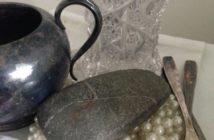NOAH’S CHILD by Eric-Emmanuel Schmitt

S is for Schmitt
Set in Belgium in 1942 during the German occupation, this novella tells the story of Joseph, a young Jewish child. Joseph’s parents are forced to flee the Gestapo and Joseph comes under the protection of a wonderful Catholic priest, Father Pons. Joseph is taken into hiding in a Catholic boarding school.
He is provided with false papers by the redoubtable and courageous Mademoiselle Marcelle, the local pharmacist. Not only is she an expert forger, she also steals medicines for the school, the Villa Jaune. Despite being a militant atheist, Marcelle and Father Pons have a deep affection for each other.
Joseph is forced to lie about his origins, although he admits he is not sure what a Jew is. Father Pons becomes a substitute father for Joseph and he finds the child an older brother, Rudy. Rudy is big, clumsy and always getting into trouble. He and Joseph develop a close and lasting relationship. There are moments of dark humour. Rudy and Joseph are discussing what Jews look like. After going through the stereotypical views of what Jews look like, Rudy says, “Mind you at the moment Jews are mainly hunted down and arrested. Just as well you’re not one Joseph.” “And it’s just as well you are not one Rudy. But you should still avoid speaking Yiddish and saying schlemazel instead of unlucky.”
Father Pons, as well as sheltering Jewish children, studies the Torah, the Kabbalah and Rabbinic texts. He also builds up a collection of sacred Jewish artefacts which he hides in a chapel.
In another scene, the Jewish boys are in the shower after P.E. After a tip-off, the Gestapo burst into the Villa Jaune. An officer enters the shower. Some of the boys instinctively try to cover their genital area to hide the fact they are circumcised. The Officer realises the boys are Jews. Joseph thinks he is going to pull out his revolver. Instead he takes a banknote from his wallet and hands it to Father Pons. “Treat these boys to some sweets.” Father Pons says that the German has restored some of his faith in human nature.
The Liberation eventually comes and the boys attempt to rebuild their lives. This is a wonderful book, a story of bravery, decency and love. Qualities of which we remain in great need.
BEASTLY THINGS by Donna Leon

The prolific author: Donna Leon
Beastly Things is part of the long-running and highly successful Commissario Brunetti series of detective novels, set in contemporary Venice.
A disfigured body is found floating in a canal. The victim has suffered multiple stab wounds. He also has a rare illness leading to deformity, Madelungs Disease. There is no identification on him, but Brunetti thinks he recognises him, if only vaguely. Brunetti eventually tracks down the murdered man’s identity. This is probably the most difficult bit of detection in the book. The murder victim is a Vet with his own practice, but also working at an abattoir on the mainland. He is responsible for certifying the health of animals to be slaughtered.
During his investigations Brunetti has the assistance of his trusty colleague Vionello. He can also call on the exception skills of Signorina Elettra. Given her talents, Office Secretary seems a poor description. She is able to hack into 90% of the computer systems around and the other 10% she knows somebody who will do it for her. Not entirely believable.
Much is made in the books of Brunetti’s family life; which seems to this reader at least near perfect. His wife Paola is a daughter of the nobility. She has decidedly left-wing feminist views and teaches English at Venice University. She is an expert on Henry James. Brunetti has two children: a son Raffi, the eldest and a daughter Chiara. Both are perfectly behaved, polite and considerate. Signora Brunetti, as well as being a highly regarded academic, is also an excellent cook. She prepares delicious home cooked meals twice a day which are described in much detail. What heaven to come home to. There is a spin-off “Commissario Brunetti Cookbook.” Although I did notice that some of the recipes use chicken stock powder. Perhaps all is not as perfect as I thought. It is probably only a matter of time before we get the Commissario Brunetti guide to successful family relationships.
There is much comment in the books on the state of both Venice (ruined by mass tourism, and I mean ruined) and Italian society in general. The Brunetti’s deplore the corruption and venality of much of Italian public life. They have a particularly poor view of former Italian Prime Minister Silvio Berlusconi.
The description of practices in the abattoir are graphic and enough to turn meat eaters into vegetarians if not vegans. It is not exactly difficult to work out the perpetrator of the crime or their motive. The book has a charming final chapter, if a description of a funeral can be described as charming. A pleasant and undemanding ride for the brain cells.
Kevin Newman. Kevin is a regular contributor to Words. He is particularly interested in the history of Europe with an emphasis on the period of upheaval of World War II. Kevin has a background in tertiary teaching. He may occasionally be found assisting with the weeding of the Merivale Community Garden.




